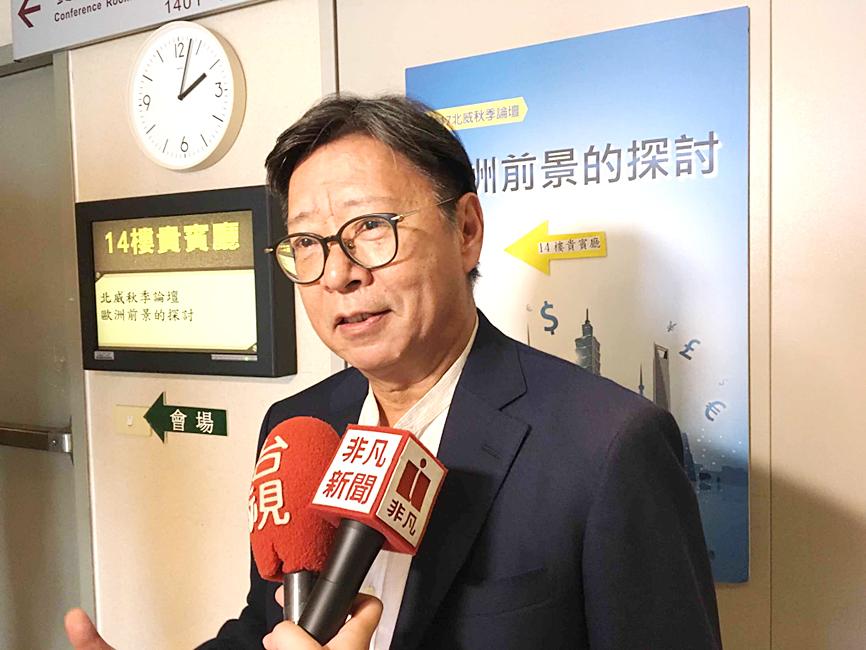IBF Financial Holdings Co (國票金控) president Michael Ding (丁予嘉) yesterday resigned over conflict of interest allegations relating to the company’s planned acquisition of EnTie Bank (安泰銀行), which is chaired by his brother, Jesse Ding (丁予康).
Michael Ding handed in his resignation at 8am ahead of a special shareholders’ meeting in Taipei where the EnTie deal was supposed to be discussed.
The move came after IBF Financial board director James Wei (魏憶龍) — who represents Hua-Kang International Asset Management Corp (華康國際資產), a corporate shareholder in IBF — on Wednesday said that an October board meeting where the deal was approved was not held in accordance with the Financial Holding Company Act (金控法).

Photo: CNA
The asset management company is an affiliate of Nice Enterprise Co (耐斯企業), which holds a stake of about 5 percent in IBF.
As the companies are led by brothers, IBF’s acquisition of EnTie should have been proposed in a special resolution, requiring approvals from a supermajority of directors, Wei said.
At least two-thirds of directors would have had to attend the meeting and at least three-quarters of attendants would have had to vote for the proposal to pass, as regulated by Article 45 of the act, Wei added.
However, the board only passed an ordinary resolution on the acquisition, which was opposed by six out of 13 directors at the meeting, Wei said.
IBF yesterday said that Michael Ding had resigned due to personal reasons, and chairman Wea Chi-lin (魏啟林) would temporarily take over for the outgoing president.
Michael Ding had avoided attending meetings where the acquisition of EnTie was discussed, the company said.
He was not involved in the company’s internal assessment of the deal, it added.
IBF said it has consulted its lawyers, who found that no special resolution would have been necessary, as the deal would be struck between the two firms, and neither of the Ding brothers would be a party in the deal.
The Financial Supervisory Commission is seeking to clarify whether there was a conflict of interest and whether Article 45 applies in this instance, Banking Bureau Chief Secretary Phil Tong (童政彰) said yesterday.
As IBF has not applied to the commission to acquire the bank or submitted minutes of board meetings, the commission could thus far not make a judgement, Tong said.
About 67 percent of shareholders attended IBF’s special shareholders’ meeting yesterday, and 73.5 percent of them voted in favor of the acquisition, the company said.

Taiwan’s technology protection rules prohibits Taiwan Semiconductor Manufacturing Co (TSMC, 台積電) from producing 2-nanometer chips abroad, so the company must keep its most cutting-edge technology at home, Minister of Economic Affairs J.W. Kuo (郭智輝) said yesterday. Kuo made the remarks in response to concerns that TSMC might be forced to produce advanced 2-nanometer chips at its fabs in Arizona ahead of schedule after former US president Donald Trump was re-elected as the next US president on Tuesday. “Since Taiwan has related regulations to protect its own technologies, TSMC cannot produce 2-nanometer chips overseas currently,” Kuo said at a meeting of the legislature’s

TECH WAR CONTINUES: The suspension of TSMC AI chips and GPUs would be a heavy blow to China’s chip designers and would affect its competitive edge Taiwan Semiconductor Manufacturing Co (TSMC, 台積電), the world’s biggest contract chipmaker, is reportedly to halt supply of artificial intelligence (AI) chips and graphics processing units (GPUs) made on 7-nanometer or more advanced process technologies from next week in order to comply with US Department of Commerce rules. TSMC has sent e-mails to its Chinese AI customers, informing them about the suspension starting on Monday, Chinese online news outlet Ijiwei.com (愛集微) reported yesterday. The US Department of Commerce has not formally unveiled further semiconductor measures against China yet. “TSMC does not comment on market rumors. TSMC is a law-abiding company and we are

FLEXIBLE: Taiwan can develop its own ground station equipment, and has highly competitive manufacturers and suppliers with diversified production, the MOEA said The Ministry of Economic Affairs (MOEA) yesterday disputed reports that suppliers to US-based Space Exploration Technologies Corp (SpaceX) had been asked to move production out of Taiwan. Reuters had reported on Tuesday last week that Elon Musk-owned SpaceX had asked their manufacturers to produce outside of Taiwan given geopolitical risks and that at least one Taiwanese supplier had been pushed to relocate production to Vietnam. SpaceX’s requests place a renewed focus on the contentious relationship Musk has had with Taiwan, especially after he said last year that Taiwan is an “integral part” of China, sparking sharp criticism from Taiwanese authorities. The ministry said

Semiconductor shares in China surged yesterday after Reuters reported the US had ordered chipmaking giant Taiwan Semiconductor Manufacturing Co (TSMC, 台積電) to halt shipments of advanced chips to Chinese customers, which investors believe could accelerate Beijing’s self-reliance efforts. TSMC yesterday started to suspend shipments of certain sophisticated chips to some Chinese clients after receiving a letter from the US Department of Commerce imposing export restrictions on those products, Reuters reported on Sunday, citing an unnamed source. The US imposed export restrictions on TSMC’s 7-nanometer or more advanced designs, Reuters reported. Investors figured that would encourage authorities to support China’s industry and bought shares